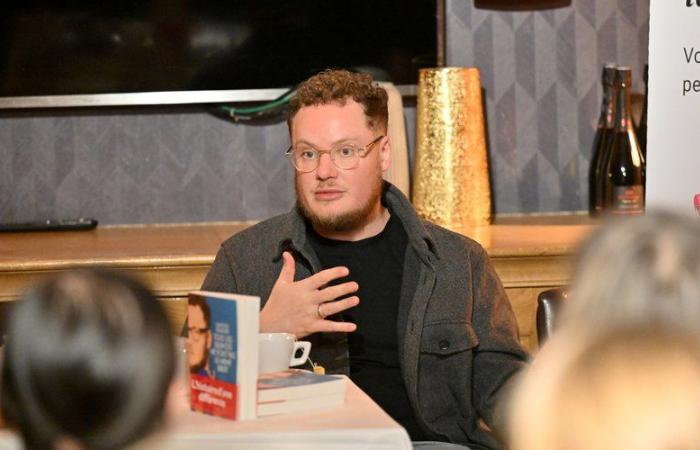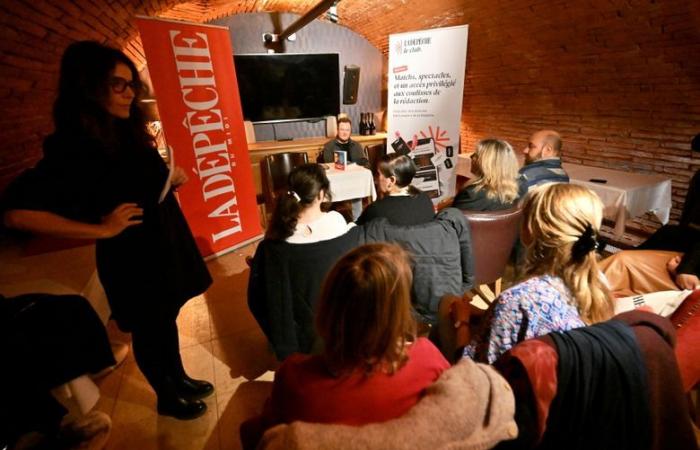the essential
Doctor and writer, Baptiste Beaulieu recently released “All silences do not make the same noise”, a book in which he talks about his journey as a homosexual. He agreed to answer questions from Dépêche du Midi subscribers during a special discussion at Bibent.
A general practitioner in Toulouse, Baptiste Beaulieu began writing with his first book, “So voilà: The 1001 lives of emergencies”, in 2013, after the blog he kept as an internet blog at Auch hospital . Today, he is on his 14th work, “All silences do not make the same noise”, recently released by L’Iclonocaste. The caregiver, who is also a writer, husband and father of a 15-month-old little boy, speaks openly about his journey as a homosexual, long painful and exhausting. He agreed to answer our questions and those of six subscribers to La Dépêche du Midi, gathered at Bibent this Thursday for a privileged exchange.
La Dépêche du Midi: You are venturing into more personal lands, to fight against racism and homophobia. How do you find time to write?
Baptiste Beaulieu: Today, it became very difficult. I work part-time in my office now. Every morning I work, and in the afternoon I write. I need the hubbub, to be drowned in the middle of life, to catch snatches of words. I often go to the Ombres blanche café. When you are a doctor, you can suffer from loneliness because patients are not supposed to be friends. There are regulars there, who also come to write. Some have become like colleagues, whom I enjoy meeting again.
Also read:
“The only time I remember that I am homosexual is when a homophobe makes a comment to me,” regrets Baptiste Beaulieu
La Dépêche du Midi: In your book, you write that being gay made you a better person. In what way?
I could summarize it with a sentence from Jean Genet: “If when blacks are persecuted, you don’t feel black, if when women are despised, or workers, you don’t feel like a woman or a worker, then, all your life, you will have been a faggot for nothing.” I think I wrote this book so I wouldn’t be a faggot for nothing. I also defend other fights than homophobia. When we experience being a minority, we are more sensitive to the suffering of others.
DDM – Nathalie Saint-Affre
Camille Viard, 36 years old, social worker: what I like about your publications is that you rely on concrete, real facts. But it’s frightening to see where society stands on the problems of domestic violence, gender equality, homophobia…
From sad consultation to sad consultation, we tell ourselves that women have not easy lives. But I am a scientist so I looked at INSEE and the statistics. And this confirms the scenarios that I see in the office. Result, one morning, we wake up and we are angry for all these women, who wear too many things. We’re two dads, we work 50/50 at home, and I’ve never been so tired in my life. What do women who have several children do, plus, sometimes, a big baby who is their husband? (laughs) It’s complicated…
Also read:
“He raised his hand on me, he called me a dirty PD”: Baptiste Beaulieu, the doctor-writer attacked by a patient
Sébastien Sacarot, 45 years old, aeronautics engineer: The beginning of your book tells exactly what I experienced: the rejection at school, the anxiety of sports class… It marks a life, it also builds a different personality, which moves away from toxic masculinity. I accept my homosexuality but I feel like I’m campaigning every day. Society is not progressing that much, there is still a lot of hypocrisy…
My books sell very well, but I know they are read a lot by concerned people, LGBT people, and women. What I would like is for women to give them to their husbands and force them to read them. I talk a lot about the condition of women, and the condition of men. The way we are taught to become boys is deplorable. We build ourselves on the basis of contradictory injunctions that are impossible for an adolescent brain to hold: we must both hate the feminine, pink, the gym, etc., and proclaim our hyper-desirability for the female sex.
Isn’t there another way of looking at masculinity? Being a man means, first of all, meeting your responsibilities, carrying the mental load equally, supporting your wife when she falls ill, going to the pediatrician, etc. But it requires a lot more effort.
DDM – Nathalie Saint-Affre
Patricia Sacarot, 68 years old, retired: How do you write? In what context do you do it?
I got into a very bad habit. I started writing in the hospital when I was going from one room to another, when I felt overwhelmed by what I saw, by the way the caregivers took care of the patients, and I wrote on my phone . I don’t know how to write otherwise. All my novels have been written like this.
I use an app, it’s like sending a very long 300 page text message to someone. This allows me to do everything. As soon as I think of something, I can write it down. It’s very obsessive, writing. When you prepare a book, you only think about it for months, and everything you see and hear can nourish it. When you have a good idea, you don’t let it go.
Camille Viard: What can we do to raise our boys well on issues of homophobia in particular?
I ask myself this question a lot with my son, who is still little. With two dads, I’m afraid of what he’ll hear at school. When we started the process of becoming parents, that’s when I started writing children’s albums, they serve as educational tools and sell very well. Unconsciously, I did this so that when he goes to school, he will be protected and the teachers will take care of him, saying “Be careful, he’s Beaulieu’s son” (laughs). Seriously, I don’t know what we can do. That makes me a little disheartened.
Camille Viard: Although we encourage discussions and bring books like yours home, they spend three quarters of their time at school…
It reminds me of a teenage patient, aged 13-14, who came to my medical office and was scarifying herself. She was hurting herself a lot. I knew straight away that her discomfort came from her homosexuality, which she had difficulty accepting. I happened to know his family, in which it was absolutely not a problem. That made me wonder.
What happens in a society for a kid who grew up in a family unit where it’s not an issue, and who hates herself so much? This means that there is a societal force which is unconscious and which pushes children to say to themselves: “It’s horrible, what I am.” We are a democratic society, we all aspire to be free. Freedom requires the analysis of currents of domination, conscious and unconscious.
Betty Viard, 61 years old, retired: It reflects all the violence that reigns in our society, especially behind the screens. “People are beautiful” is the title of one of your books. Why not accept everyone as they are?
Especially since we are all different. If you get on a subway train, there isn’t a single person who isn’t silently struggling, alone in their bathroom, with something they don’t talk to anyone about. It can be lots of different things: being overweight, eczema, a crazy boss… We’re all struggling with something. Maybe if we told each other, we would feel less alone.
Patricia Sacarot: Why are people so intolerant? What bothers them?
For years, I tried to take refuge in “Born this way”, a very common argument in the gay community which means: “I was born this way, I didn’t choose, so don’t hit me. ” I come back to this argument by saying: even if I had chosen, what right do we have to come and watch what two consenting adults are doing in their bedroom? As a result, we shift the subject from sexuality to individual freedom.
Reactionary countries are seizing on these subjects. It starts in the United States, where they are attacking marriage for all, trans people and abortion. In Russia, they forbid women from openly saying that they don’t want children. Straight people who don’t feel concerned, I want to tell them that everyone is concerned by individual freedoms.







